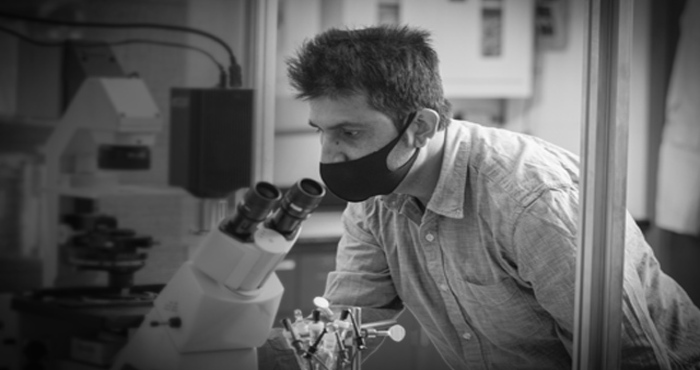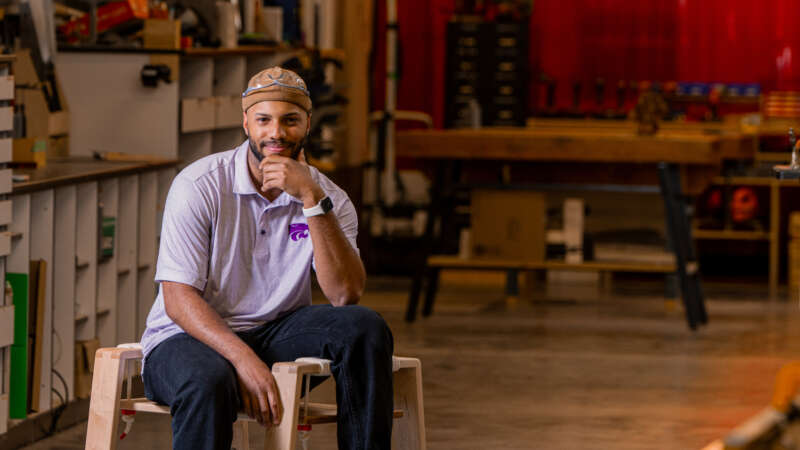Major grant award funds ground-breaking research at K-State
Many scientists dream of participating in research that could impact science in a fundamental way. That dream is a reality for two Kansas State University graduate students in physics — Krishna Panta and Shital Rijal. They are part of a team looking at new ways to speed up chemical reactions. Their team’s work was awarded a prestigious $1 million grant.
Bret Flanders, professor of physics and Paul Smith, professor of chemistry, both at Kansas State University, and their research partner Christine Orme of the Lawrence Livermore National Laboratory in Livermore, California, earned the grant from the W. M. Keck Foundation. The Keck Foundation grant will support the three principal investigators, two graduate students, a post-doctoral student, and the purchase of key pieces of instrumentation, including a total internal reflection microscope, over a three-year period.
The project Flanders, Smith and the team are working on is basic research, which asks fundamental questions about complex problems. Sometimes, those questions lead to ground-breaking discoveries that change how we view the world or do specific tasks — and Flanders and Smith involve students in making those discoveries.
Their project asks whether there are new physical processes that can bring molecules together under mild conditions to create new, more complex molecules instead of using the “tried-and-true” methods of heating or using an expensive catalyst to make the same molecule. “Applying a new method to making a complex pharmaceutical, for example, could reduce the cost of that drug,” said Peter Dorhout, vice president for research at Kansas State.
“Imagine trying to build a large and complex house by bringing together two previously-assembled halves — you need large equipment and a lot of energy to move big, heavy pieces in place, and you risk destroying one or both halves in the process,” Dorhout said. “If you could gently move those parts together without all the energy involved, that would be a breakthrough. The same is true for making large molecules — you need a lot of energy (heat) to get the larger pieces together in one step, and that could break them apart. This team is testing whether there are gentler, less expensive ways to make large complex molecules.”
“If Bret is successful in what he wants to accomplish, that new knowledge, that breakthrough may lead to other grants from governmental agencies that suddenly wake up to the fact that despite his concept being pretty risky and unproven, Bret demonstrated he could do it,” said Dorhout. “There’s a proof of concept. It can seed a lot of other new ideas and new discoveries. That is Keck’s goal — they want people to be innovative, change the science, and take risks.”
Based in Los Angeles, the W. M. Keck Foundation was established in 1954 by the late W. M. Keck, founder of the Superior Oil Company. The foundation’s grant making is focused primarily on pioneering efforts in the areas of medical research and science and engineering. The foundation also maintains a Southern California Grant Program that provides support for the Los Angeles community, with a special emphasis on children and youth.
“The Keck grant is prestigious because they invest carefully and specifically in wanting to make a difference and have an impact in selected areas,” Dorhout said. “Their grants are few and far between, and they’re fairly substantial. This award speaks very highly of our faculty, particularly Bret as primary investigator. To be able to have a creative idea that ultimately gets their attention is fantastic.”
The Keck Foundation grant not only supports cutting-edge research, it helps launch careers of young scientists. “This grant is supporting me financially so that I don’t have to find alternatives for financial support such as teaching,” said Krishna Panta, a doctoral student working with Bret Flanders on the project. “The Keck grant is helping us to take our research to a new level by providing us with access to research-specific resources and materials. Benefits of this grant extend beyond my research project and even my degree. It helps to build reputation and connections that I will need to generate more opportunities once I complete my degree.”
Shital Rijal is also a doctoral student working with Flanders and receives support from the Keck Foundation grant. “As graduate students, we need to work diligently on research and also think about the expenses for the entire family,” Rijal said. “Being an international student, I do not have several choices of income. I either have to work as a teaching assistant or as a research assistant. The Keck Foundation grant allows me the privilege of the latter job. It would have been tough to do both teaching and research simultaneously. Instead, I can use the time to focus more on the research part that is the basic purpose of my graduate studies.”
Originally published in February 2021.






